

Al- Hakawati. Feminism in a nationalist century. We A Need A Revolution in Egypt .. A Social Revolution. Egyptian Feminist Huda Shaarawi (1879-1947) In Celebration of International Women’s Day: Egyptian Women Writers. Huda Shaarawi is at center.
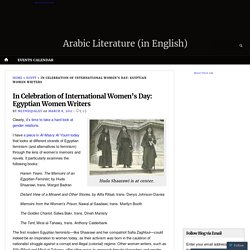
Clearly, it’s time to take a hard look at gender relations. I have a piece in Al Masry Al Youm today that looks at different strands of Egyptian feminism (and alternatives to feminism) through the lens of women’s memoirs and novels. It particularly examines the following books: Harem Years: The Memoirs of an Egyptian Feminist, by Huda Shaarawi, trans. Margot Badran Distant View of a Minaret and Other Stories, by Alifa Rifaat, trans. Memoirs from the Women’s Prison, Nawal al-Saadawi, trans. The Golden Chariot, Salwa Bakr, trans. The Tent, Miral al-Tahawy, trans. Carving a Place in Society. A spring Saturday afternoon is meant for romantic walks in parks, a day out with the children and sharing a bowl of fruit salad on the beach.
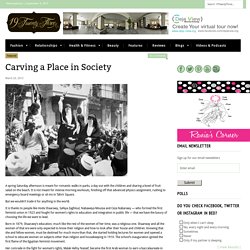
It is not meant for intense morning workouts, finishing off that advanced physics assignment, rushing to emergency board meetings or sit-ins in Tahrir Square. But we wouldn’t trade it for anything in the world. It is thanks to people like Hoda Shaarawy, Safeya Zaghloul, Nabaweya Moussa and Ceza Nabarawy — who formed the first feminist union in 1923 and fought for women’s rights to education and integration in public life — that we have the luxury of choosing the life we want to lead.
Born in 1879, Shaarawy’s education, much like the rest of the women of her time, was a religious one. Shaarway and all the women of that era were only expected to know their religion and how to look after their house and children. What Do You Want to Be When you Grow Up? “What do you want to be when you grow up?”

It is always one of those questions that we bust our heads trying to come up with an answer for, and its answer normally ranges from becoming a doctor, a teacher, an actress and maybe even a circus performer — the possibilities are endless. Yet 90 years ago, the answer to that question, if it had been ever asked, was rather simple; little girls dreamt of becoming wives and then mothers. That’s that. Hijab and a Revelation that was not. A.
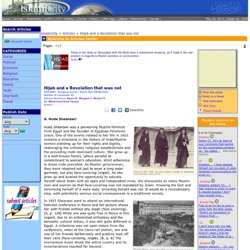
Huda Shaarawi: Huda Shaarawi was a pioneering Muslim feminist from Egypt and the founder of Egyptian Feminists Union. One of the events related to her life in 1923 remains a milestone in the history of Arab/Muslim women standing up for their rights and dignity, challenging the orthodox religious establishment and the prevailing male-dominant culture. She grew up in a well-known family, where parallel to commitment to women's education, strict adherence to dress code prevailed. As Muslim girls/women, they were required not just to wear a long outer garment, but also face-covering (niqab).
In 1923 Shaarawi went to attend an international feminist conference in Rome and her picture shows her with friends without any niqab (face covering). [6, p. 128] While she was quite free in Rome in this regard, due to an entrenched orthodoxy and the domestic cultural milieu, it was still quite different in Egypt. B. C. The picture is credited to Susan Davis . Conclusion. Huda Shaarawi. Huda Sha`arawi (left) and Safia Zaghloul (right).
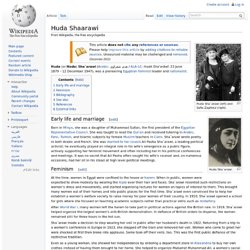
Huda Sha`arawi. Huda (or Hoda ) Sha`arawi ( Arabic : هدى شعراوي / ALA-LC : Hudá Sha‘arāwī ; 23 June 1879 – 12 December 1947), was a pioneering Egyptian feminist leader and nationalist . Early life and marriage [ edit ] Born in Minya , she was a daughter of Muhammad Sultan, the first president of the Egyptian Representative Council .
She was taught to read the Qur'an and received tutoring in Arabic , Farsi , Turkish , and Islamic subjects by female Muslim teachers in Cairo . Feminism [ edit ] At the time, women in Egypt were confined to the house or harem . After World War I , many women left the harem to take part in political actions against the British rule. Feminism and the Arab Spring: Reflections on the Anniversary of Hoda Shaarawi’s Passing. A look back at the life and achievements of Egyptian feminist Hoda Shaarawi raises many questions about the state of the Arab women’s movement today.
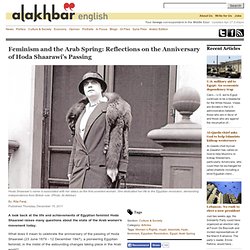
What does it mean to celebrate the anniversary of the passing of Hoda Shaarawi (23 June 1879 - 12 December 1947), a pioneering Egyptian feminist, in the midst of the astounding changes taking place in the Arab world? Nabawiyya Musa. Nabawiya Musa was born December 17th 1886 and died in 1951.
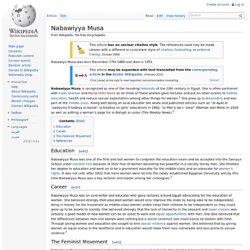
Nabawiyya Musa is recognized as one of the founding feminists of the 20th century in Egypt. She is often partnered with Huda Sharawi and Malak Hifni Nasif as all three of these women gave lectures and put on other events to further education , health and reduce sexual exploitation among other things for women. 1 She grew up in Alexandria and was part of the middle-class .
Along with being an avid educator she wrote and published articles such as “al-Ayat al –badyyina fi tarbiya al-banat" (a treatise on girls’ education) in 1902, "al-Mar’a wa-l-‘amal" (Woman and Work) in 1920 as well as editing a woman’s page for al-Balagh al-usbui (The Weekly News). 2 Education [ edit ] The Liberation of Women: And The New Woman. Two Documents in the History of ... - Qāsim Amīn - Google Books.